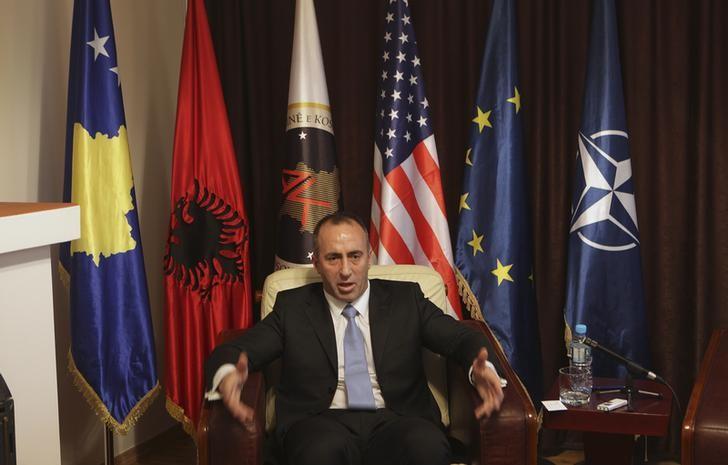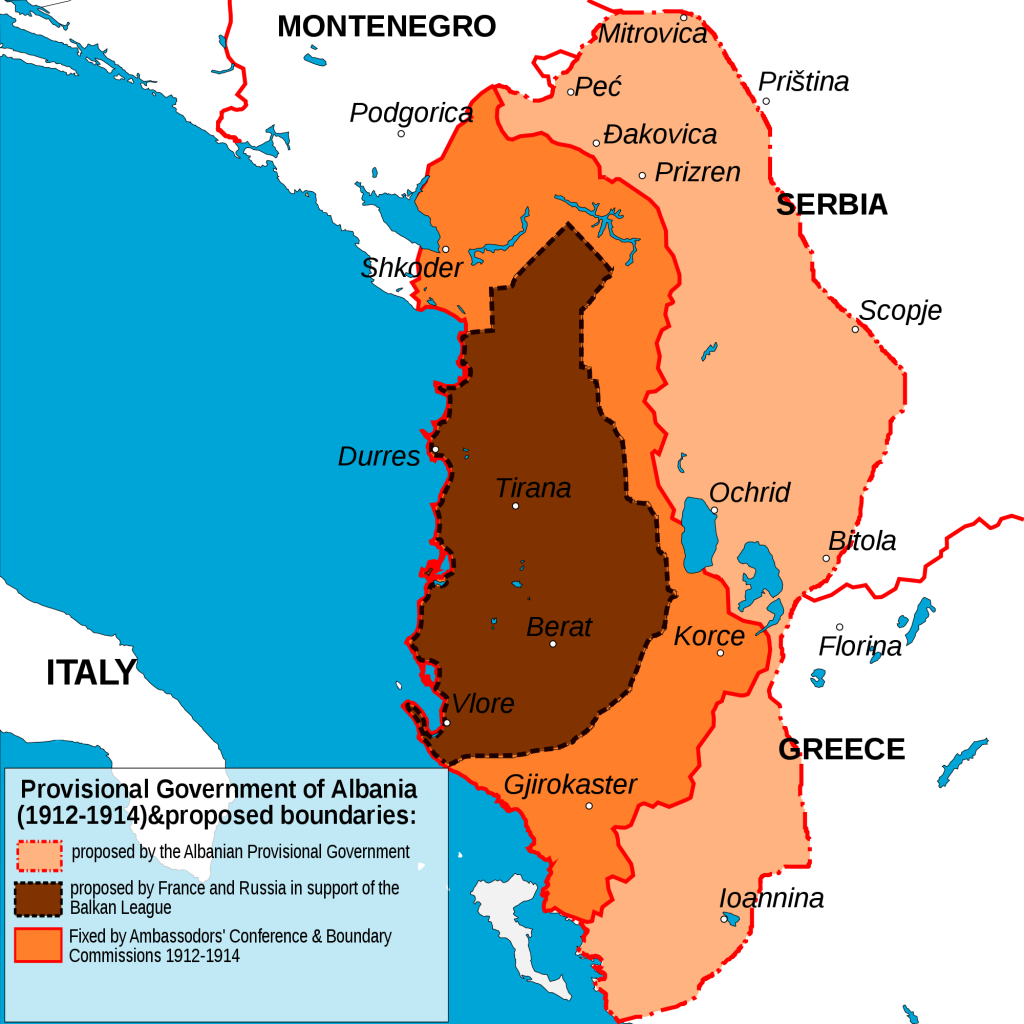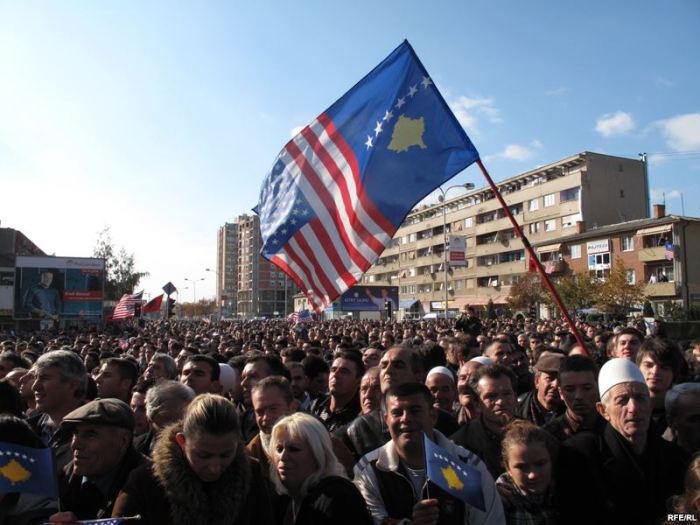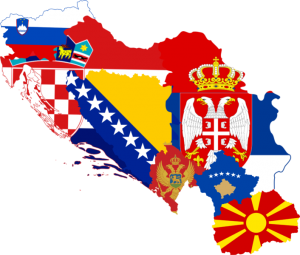
President of the Alliance for the Future of Kosovo (AAK) Ramush Haradinaj, a Kosovo Albanian former guerilla commander who served briefly as prime minister, speaks during an interview with Reuters at the AAK headquarters in Pristina December 4, 2012. REUTERS/Hazir Reka
Views: 697

The Balkans has always been cursed by a recurring theme: that each entity within it can, at some point, become greater and more consuming in territory than the next neighbour. Each nation has, and in some instances continues, to nurse dreams of enlargement, pecking away at borders and assuming that few will notice.
Strategies of expansion tend to have one problem: they are hard to evaluate in the way of conventional agreement, contract or conspiracy. For decades, historians of various shades would attribute to Imperial Germany a conscious, global goal of conquest, mistaking the plans of contingent invasion with actual policy.
In the Albanian context, the gnawing phenomenon, one of a terrier insistent on chewing away at the sinews of a larger opponent, has been taking place since Yugoslavia imploded in spectacularly bloody fashion in the early 1990s.
A cementing aspect of the old project of unity, one that saw the creation of Tito’s Yugoslavia, was Kosovo; central to the current Albanian project of consolidation and security is the increasing influence of figures within southern Serbia and Macedonia, generally Albanian nationalists of various colours of severity who dare to dream. With Serbia the tainted bogeyman of Europe, their chances are better than ever.
The writing is already being scribbled on the wall – with feverish enthusiasm. Albanian Prime Minister Edi Rama had expressed the view that an Albanian-Kosovo union would be very much on the cards if the EU were to make admission more challenging. Kosovo’s President Hashim Thaçi [former leader of the KLA, on the Interpol list] was even blunter, his words having the effect of a threateningly deployed mallet:
“all Albanians in the region will live in a single, united country so that the integration into the European family may continue”.[1]
The fear to Serbia’s north, in Belgrade, is amply reflected by Serbian cabinet minister Aleksandar Vulin:
“Pristina and Tirana have clearly said what their goal is, it is a ‘Greater Albania’ and unification of all Albanians, regardless of where they live, into a single ethnic area.”
Accordingly, this could “only be accomplished through a great Balkan war, and Brussels (EU) must be clear on all of this.”[2] Given the current obsession with the unraveling of the EU, best indicated by the groans of Brexit, it is unlikely whether any eyes are being peeled on that score.
Members of a nation, as opposed to the idea of a state, remain the great problem international relations after the First World War. No better illustration of this was offered than the nationalist gymnastics that unfolded in the aftermath of a destroyed Europe.
Demography has become central in these latest disputes. In southern Serbia, where the breath of Greater Albania blows, ethnic Serbs are in demographic retreat before their more virile Albanian neighbours. This situation seems calm, but is actually electric, a surface energy that may well only resolve itself by the power of the gun.
In its broader theatre, Albanian leaders are cunningly playing the pro-Western card to keep western powers on side. This is to be expected, given the shrewdness that resourcefulness entails. As the Albanian foreign minister Ditmir Bushati explained in his April visit to Washington, his country provided an appropriate, stern bastion against Russian influence in the Balkans.
These broader ambitions are not to be taken lightly. Technically, it could see Serbia amputated as far as Niš. This point is perceived as another territorial reassertion, given the expulsion of Albanians from the area during the Serbian campaigns of the 1870s.
Municipalities in southern Serbia have griped and groaned over the nationalist issue, centred upon Preševo, Medveđa and Bujanovac. Hot heads, from time to time, reach for their flags with heart. Editorials of irritation, barely tempered, are written.
The issue of secessionist violence is far from a moot point, given the insurgency in the Prešovo Valley from 1999 to 2001 mounted by the Liberal Army of Preševo, Medveđa and Bujanovac. The violence reached such levels that the then Yugoslav President Vojislav Koštunica urged the NATO-led KFOR to intervene, given the handbrake that had been applied to Serbian freedom of action.
In Macedonia, a country with a strong Albanian voice, similar issues are on the march. A vigorous Albanian push (some argue putsch) remains a persistent reality for the Macedonian majority. The fraying began last December with the opposition Social Democrats achieving a parliamentary majority by going into coalition with parties representing ethnic-Albanian interests.
The long standing VMRO-DPMNE government, backed by President Gjorge Ivanov, refused to budge, fearing the new power arrangements. Matters duly got violent with a coalition attempt to elect a new parliamentary speaker.
The deputy leader of the Social Democrats, Radmila Šekerinska, deemed by Balkan Insight to be “Brussels’ favourite Macedonian”, was duly assaulted when Parliament was stormed by 200 protestors on April 27. Social Democratic Union leader Zoran Zaev and lawmaker Ziadin Sela, leader of the Albanian Alliance, were also injured.
The government beef was an ethnic one. It was claimed by such figures as Ivanov that too much was in the offing by way of concessions to Macedonia’s Albanians, who were exerting a natural gravitational pull on the Social Democrats.
Šekerinska insists that that issue is tactical, designed to obscure the need to create “a new reform-oriented government” that would hold various politicians accountable for criminal theft and corruption.[3] Prime Minister Nikola Guevski and his associates, claims Jove Kekenovski,
“are ready to do anything, including ethnic conflict, to escape jail.”[4]
Some of that is bound to be true, though blood tends to be thicker than reform in Balkan politics. A resort to the gun over the boardroom; this is the Balkan vice, tainted by active or cynical indifference from outside powers.
Notes
[1] https://europeanwesternbalkans.com/2017/04/20/thaci-albanians-to-unite-if-eu-closes-door-to-kosovo/
[3] http://www.bbc.com/news/world-europe-39799208
[4] http://www.politico.eu/article/post-election-limbo-deepens-macedonian-stand-off-gjorge-ivanov/
Originally published on 2017-05-05
About the author: Dr. Binoy Kampmark was a Commonwealth Scholar at Selwyn College, Cambridge. He lectures at RMIT University, Melbourne.
Source: Global Research
Origins of images: Facebook, Twitter, Wikimedia, Wikipedia, Flickr, Google, Imageinjection & Pinterest.
Read our Disclaimer/Legal Statement!
Donate to Support Us
We would like to ask you to consider a small donation to help our team keep working. We accept no advertising and rely only on you, our readers, to keep us digging the truth on history, global politics and international relations.
FOLLOW US ON OUR SOCIAL PLATFORMS












